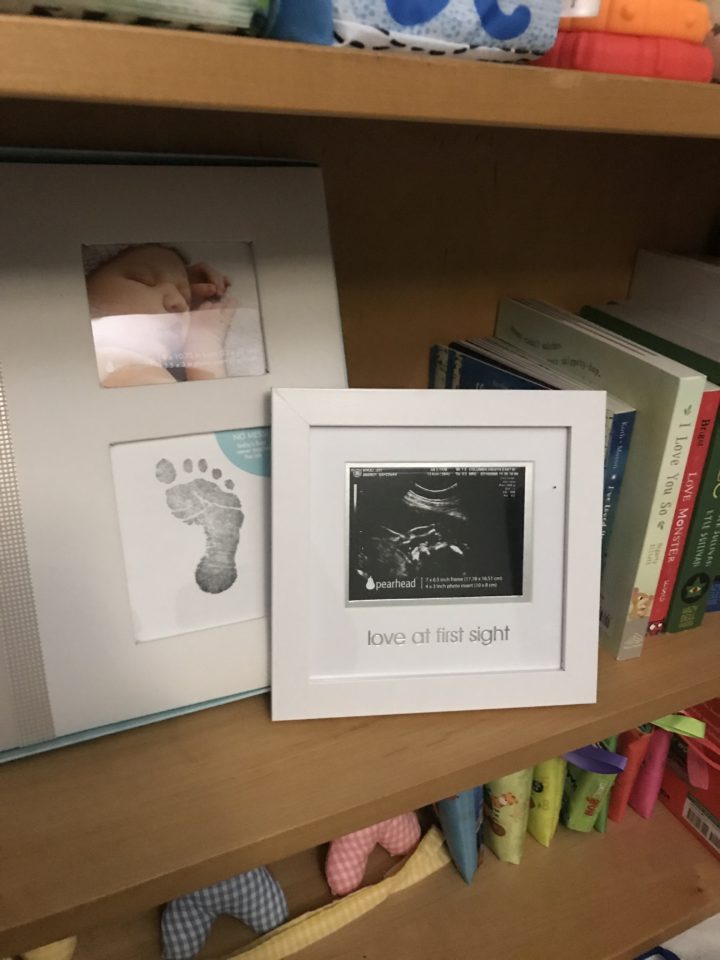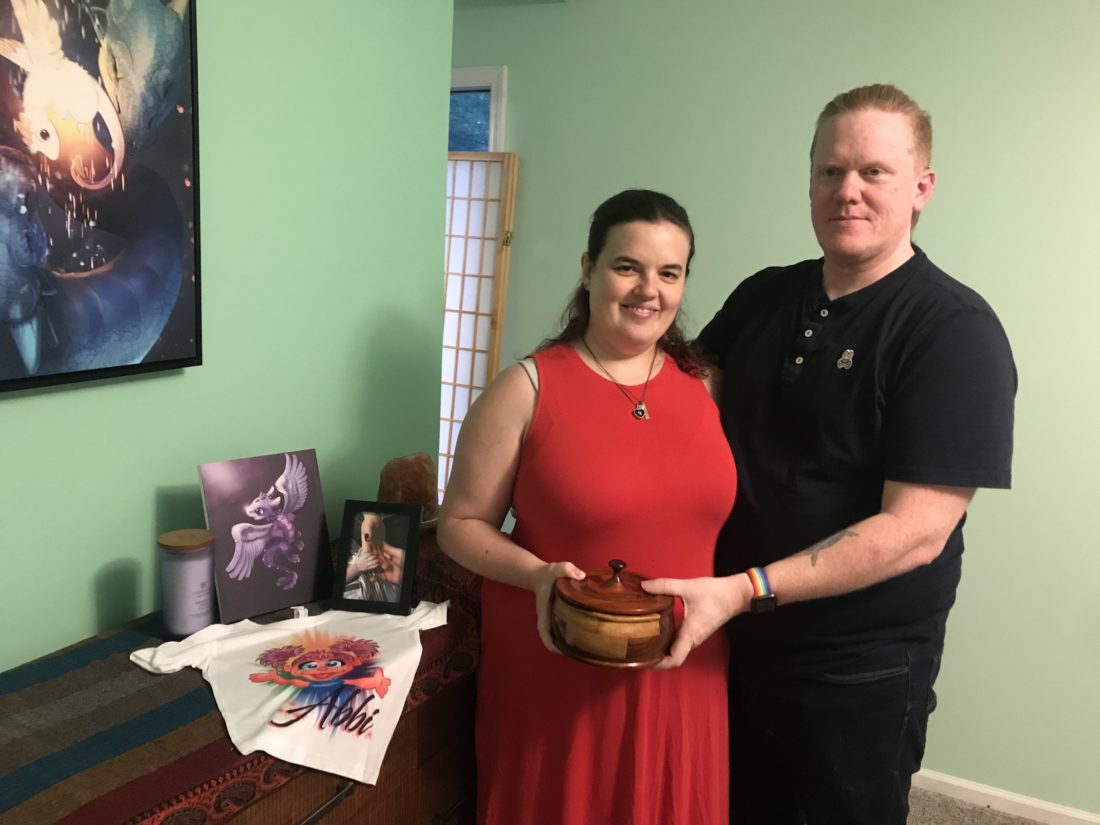Abigail Mary Elizabeth Crawford’s life started sometime in the weeks before Oct. 4, 2020. That was the date her mother, Jenna Crawford, giddily leapt on top of her sleeping father, Garry Wynn, holding a positive pregnancy test at 5:30 a.m. Wynn remembers Oct. 4 as “an unbelievably magic day.”
The couple sailed ahead through milestones as the pregnancy progressed. They wrote a birth plan. Friends, family and co-workers threw them baby showers. They watched Abigail’s heart flutter on an ultrasound. She’d kick her mom’s belly when she heard her dad’s voice. “She looked great; her heartbeat was great every time,” Crawford says.
Abigail’s life ended sometime in late May or early June, during her 38th or 39th week of gestation. A few weeks prior, Crawford and Wynn learned she had scarcely grown in the previous weeks. Crawford remembers hearing that her consistently healthy blood pressure had gone up; she awoke one May night in her Arden home with a “blinding headache.”
Crawford does not know if either of these symptoms were related to Abigail’s death. She never distinctly felt her daughter stop moving. But Abigail suddenly felt “really heavy-feeling” in utero.
“The one thing that echoes like a billiard table in my brain is I said, ‘She feels like concrete,’” Crawford recalls. An ultrasound during the routine checkup for her 39th week revealed Abigail didn’t have a heartbeat.
Stillbirth is a fetal death that occurs after 20 weeks of pregnancy; prior to that date, a death in utero is called a miscarriage. In 2017, North Carolina had a stillbirth rate of 6.6 per 1,000 pregnancies, according to the Star Legacy Foundation, a nonprofit dedicated to research on and support for pregnancy loss. That’s slightly higher than the nationwide stillbirth rate of 5.9 deaths per 1,000 live births.
All prospective parents know stillbirth is a possibility; umbilical cord accidents and infections are among the most common causes. But Crawford and Wynn say they never received more detailed information about stillbirth during pregnancy care, which contributed to their shock. “Never once during the videos does it talk about this might happen,” Wynn says. “Everything’s always rosy.”
The medical establishment rarely discusses the possibility of infant loss with prospective parents, says Katherine Hyde-Hensley, an Asheville psychotherapist and perinatal loss doula who lost a child in 2005. Prenatal care warns about pregnancy risk factors such as smoking or stress, she says, but many parents feel kept in the dark about stillbirths.
Ultimately, Abigail’s cause of death does not matter, her parents tell Xpress, sitting side by side on a couch in their home. Abigail’s remains rest inside a wooden box on the coffee table next to a pink T-shirt of Abby Cadabby from “Sesame Street.” “We still don’t know what happened. We don’t need to know; we don’t want to know,” says Crawford. “It doesn’t serve any purpose.”
Preserving memories
Parents have options after a child dies, Hyde-Hensley says. Families need to know they can take their baby home; many want to take handprints and footprints or take photographs together. She’d like to see more widespread use of death doulas — family advocates who specialize in helping navigate death — for grieving parents after stillbirth.
Following the ultrasound that confirmed Abigail’s death, Crawford’s OB-GYN informed the couple that they could go home and wait for labor to begin. They opted to go directly to Mission Hospital for a cesarean section the next morning. At 8:58 a.m. June 3, Crawford delivered Abigail at 5 pounds, 15 ounces and 20 inches long.
Mission’s labor and delivery staff placed a placard depicting a leaf with a teardrop outside their hospital room. The signage — materials the hospital uses from Resolve Through Sharing bereavement training — indicates the situation inside the room may be sensitive, says Mary Cascio, director of the Mother-Baby Unit at Mission Hospital.
The couple also used a cooling bassinet called a “Cuddle Cot,” which allowed them to spend all of June 3 with Abigail. The device “allows parents more time to say goodbye, up to two to three days,” explains Cascio. Without one, she says, “Babies must be taken within a few hours of birth.” (Mission’s Cuddle Cot was donated by the family of James Julian Ashe, a Candler child who died at 5 months old in 2017, as part of the U.S. Cuddle Cot Campaign Initiative.
“They treated her like a living child, which was gorgeous,” says Crawford. “They did fingerprints, footprints, weight and measurements. They let us wash her and dress her. They had a little cap for her; they had a little bear for her.”

Says Cascio, “We always take care to preserve memories for the family.” Families can receive donated blankets, hats, gowns and other mementos for spending time with their child after a death. She notes that when a grieving family has older children, a Certified Child Life Specialist can guide their care during this time.
Families benefit from “tangible items” to make memories with their infant, says Hyde-Hensley. “They validate that this baby was alive and born and part of the family,” she explains.
Amid the somber mood, Crawford and Wynn packed a life’s worth of celebration into one day. A nurse who had recently celebrated a birthday gave the couple a cupcake, so they sang “Happy Birthday” to Abigail. A volunteer from Now I Lay Me Down to Sleep, which provides free family portraits for grieving families, took photographs of Abigail in a colorful onesie; Crawford’s dad took 300 photos as well.
Close to 11 p.m., Abigail’s parents said goodbye. She was placed in a pretty box, provided by Mission from Resolve Through Sharing. Crawford and Wynn wrote their daughter a letter; each then cut their hair and braided it together for the cremation. A nurse waited with Abigail until she was collected by Harwood Home for Funerals and Cremation Services in Black Mountain, which offered their services at no cost.
The couple left the hospital the next day — Crawford’s 36th birthday — and returned home. Although Abigail’s nursery is still set up with her crib, bookcase and a dragon-shaped rocking horse, the family removed all other baby accoutrements from their house and donated perishables.
A way forward
Following the death of an infant, parents need more than the standard follow-up appointment with an OB-GYN, says Hyde-Hensley. Postpartum depression and post-traumatic stress disorder are more common after stillbirth and can affect either parent, so resources like psychotherapy and grief support groups are particularly important.
“We were pretty much not left alone for about two weeks straight, because we were pretty much destined to want to kill ourselves,” says Crawford about her and Wynn’s return home. “I saw no reason to keep living.”
She hasn’t received a diagnosis for a mental health condition but describes experiencing profound anxiety, numbness and sadness. She and Wynn sought out Hyde-Hensley as a therapist and attend online support groups for bereaved parents through the Star Legacy Foundation.
Families experience complex grief after the loss of a child, and the phases of grief, “while they’re like seasons, they don’t flow in an order,” says Hyde-Hensley. Suicidal ideation comes from a place of “wanting to be at peace with your child, even if that was to mean to not being here on Earth,” she explains. In Asheville, the Perinatal Emotional Health Network of WNC, a collaboration among health providers, partners with Postpartum Support International to screen mothers who are at risk of postpartum depression or a mood disorder.
Wynn describes a frustration at how many perinatal grief resources focus on the birth parent. “You’re not the patient, so dads are forgotten about,” Wynn says. The pressure for men not to show sadness was also difficult for him; he recalls other men telling him that he needed to be “strong.”
While Crawford was able to get prescriptions for antidepressants and anti-anxiety medication in the hospital, Wynn says he did not see a general practitioner for mental health care support until three weeks after Abigail’s death.
“The nonbirthing parent … is often overlooked because they didn’t carry the child and feel the child,” says Hyde-Hensley. “They grieve twice: They grieve for their partner and they grieve their own lack of connection in the pregnancy.” (Support groups do exist for nonbirthing parents, typically called “fathers’ support groups”; she points to the nonprofit Return to Zero: Hope for resources.)
The couple are adamant that there is no healing from their loss, only moving forward. “I remember one day the clouds parted enough where I could finally breathe a little bit and I said, ‘OK, I need to start figuring out a way to exist in the world again,’” says Crawford. She and her mother sewed a 6 pound pillow in purple fabric — Abigail’s color — which they hold.
“It’s always ‘before Abigail’ and ‘now’ — there’s never going to be an ‘after Abigail,’ but there’s now ‘with Abigail’” Crawford says. “You don’t move on, but you find a way to move forward.”
UPDATE OCTOBER 7, 2021: This article has been updated to reflected that Harwood Home for Funerals and Cremation Services in Black Mountain provided their services.



So sorry for the loss of your daughter but so glad you were able to celebrate her before she had to leave… What you did will be an example for others in your position.